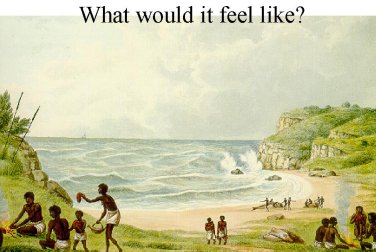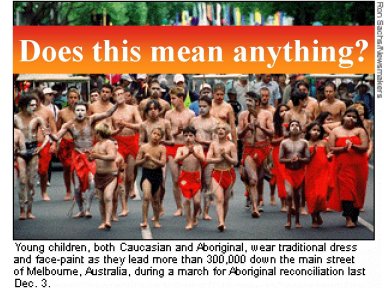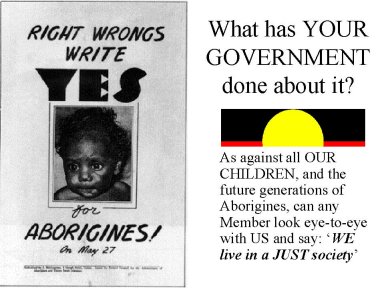The Aboriginal Voice |
Gary Caines, Dharawal Man - Southern Catchment Management Board
Good morning. Thanks Professor Bruce Thom. I have a few slides here and I'd to take you through them and open up the floor to discussion and questions.
Can everyone see the graphic on the screen at the moment? |
 |
Has everyone got the feeling of what it used to be like across country, along the coast and the estuaries. We had own governance, our own.
There was once, on a day, day after day and through the night, on our mother, that we could fish, swim, hunt, laugh, work, make art, make tools, have get-togethers on lands with friends. But on whatever day it was, first contact, impacts were in 1788 radically taken away and today it's very much like that for all peoples, and our peoples. There's a lock-out on familiar places, and on spaces and on faces. Yes we have to pay, and its difficult that we can't relate in our own culture amongst ourselves on traditional lands. Cross-culturally its hard to feel reason in our hearts and find it in our minds as to why we have trouble talking about and looking sincerely at the state of play these days. In that last dot point - well I got an invitation today too.
There's a caption. Does this graphic mean anything? |
 |
It has meant a lot to Australian's right across Australia. And here's one from Melbounre in December last year of the willingness to recognise people, relate to people, and empathise with people. Our diminition in contemporary times. We can walk the walk and talk the talk. And we have built bridges in our hearts and minds in how we relate legally, morally and in spirit as well. The caption is from December 3 last year and there are many images of that across the country - coastal, in the mountains and in the outback as well.
In NSW where we have estuaries, there are alarming figures which I believe were presented this morning about 0.001% [of the marine environment] being available [as marine reserves] of which 5% are 'no take' and this is for all of us in today's time.
Where is the practical commitment to justice and opportunity for Aborigines? In jobs, natural resources, economic resources, access and use freedoms, decision making authority? It's not there. There are tasic commitments to go with the documents in public policy and government acts and regulations and committees at the grass-roots levels to do things about the jobs, the resources, access etc.
For the Aborigines, is it more than interest in the history of the dead as in our cultural sites and archealogy? The cultural tourism on our lands, and the stories, undocumented, but the stories are there. The bottom line now is, for all of us, what about the future for our children, and their children?
Over 30 years ago - nationwide - the people spoke to right wrongs, to vote 'yes' for Aborigines. |
 |
Has that built our capacity? Amongst this sophistication, do we have more voice and more input today? The things that government has done since that time, and are doing now, is against all our children and the future generations of all of us. Can any Member of the Houses look eye-to-eye with us and say "We live in a just society"? Just what it is today. But we still have power. Even the Aborigines.we've survived, and we all will.
This coastal peoples.we have a pre-eminent place in the landscapes. The landscape is changing from what it used to be to what we have now. I'd welcome discussion and questions on how we identify the landscape, ourselves and how we relate on country; cross-culturally. And now, in the current development of multi-culturalism, do our past relations and our cultural identities become lost in the current fabric? What we used to do, our customs, our beliefs, our foundations from where we come and who we are today is the issue. Aborigines had freedoms and access inhibited in the past and we've undergone change. What it's done to the least of our brothers and sisters is now coming possibly unjust unto us all. And what happens on country is having an impact in the form of runoff, wind and storm and other events that transform, clog, choke, re-regulate the way we use our coasts and estuaries and riverine flows across country. And these elements on country are like the blood in our veins and I know we all feel a common link to that life and to the forces around us.
Thank you |
| back to Estuary Forum 2002 index |



